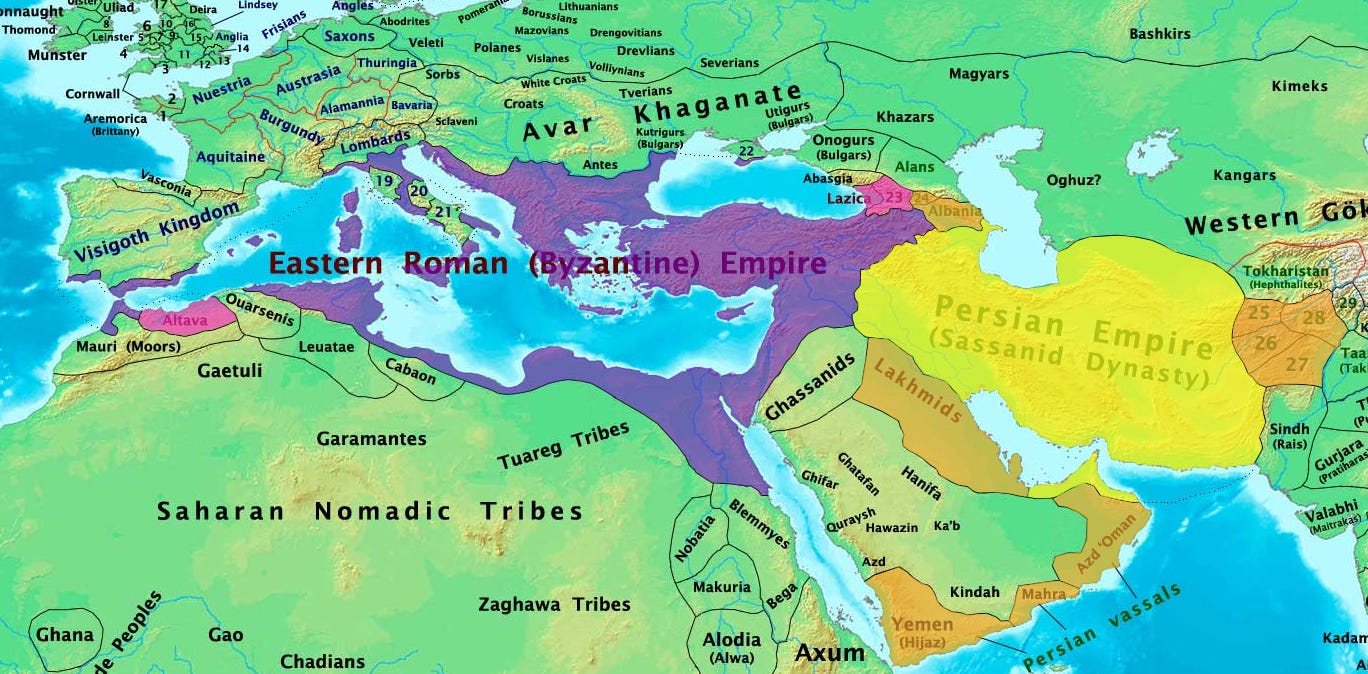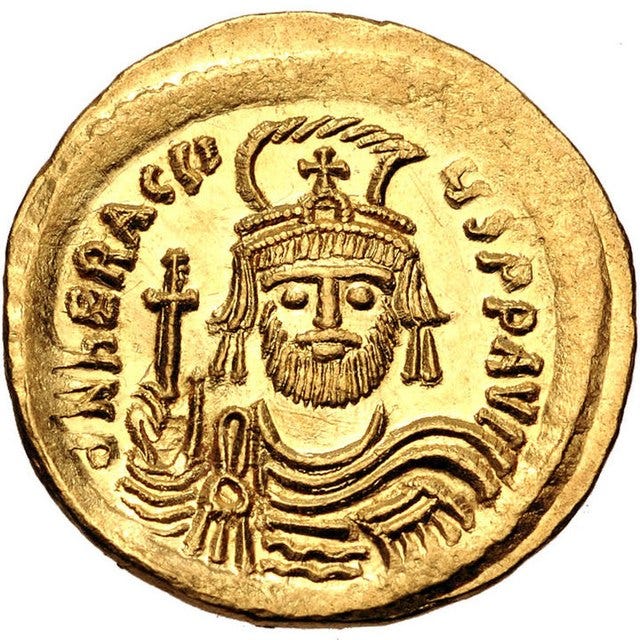A Steppe in History: August 9, 2022
A Steppe in History is the weekly newsletter of the Nomads and Empires podcast. In this short-form newsletter, I will bring up interesting tibids, factoids, and thoughts on history that I found throughout the week. This is mostly just a quick survey of the things that I thought were really interesting, so enjoy!
Heraclius and the Development of Jihad
One area of history that I’ve always found utterly fascinating is the late antique, specifically the years leading up to the rise of Islam. I’ve written about this before, and a prior iteration of the Nomads and Empires podcast once examined the nexus of great powers like the Kingdom of Axum and the Sassanid Persians. In many ways, this is an era that feels very apocalyptic. The 6th and 7th centuries were defined by great wars that affected the entire Mediterranean world. The Persians and the Romans engaged in numerous conflicts. The Axumites invaded Yemen and destroyed the Himyarite kingdom. The Persians were raided by the Hephthalites, and so on. The whole world seemed embroiled in warfare and destruction.
Nowhere was safe, even the areas on the periphery. Across the Roman and Persian borders, in the lands of Arabia, this sense of lingering doom was palpable. Trade choked as warfare destroyed the traditional routes that Arab caravans once followed. Great Arab kingdoms, like the Lakhmids and the Kindah, were memories in the sand by the time of the Prophet Muhammad’s birth. In some areas, famine and plague ran rampant. One can imagine that in this context, great religions built on eschatological foundations could emerge, and to some extent, I think this is an important consideration when assessing the development of Islam.

“Eschatological-imperialistic tendencies were current in the period immediately preceding the Arabian expansion. According to ideas spread among both Jews and Christians (but also among Zoroastrians), a chosen community of believers was destined to achieve a cosmocratic rule before the world comes to an end.”1
This context is especially interesting when we think about the titanic struggle of the Sassanid-Roman wars. In an AMA conducted by the scholar Gabriel Said Reynolds, he briefly mentions the role of Emperor Heraclius in influencing certain Islamic concepts, such as the development of holy war, or “Jihad.” It is here where I found myself enamored. Anyone who has read the Qur’an is aware of the role of the Byzantines. Surat 30 is known as the “Surat al-Rum,” and it discusses the Persian-Roman War of 602-628. The works of the 9th century historian al-Tabari recounts an incident where the Prophet Muhammad is said to have chastised individuals who cheered in response to a Byzantine defeat. Furthermore, Byzantine relationships with other Arab polities like the Ghassanids and the Tanukhids highlights to the significant role the Eastern Roman Empire played in the Arab world.
In the aftermath of the Sassanid conquest of Jerusalem in 614 CE, the Emperor Heraclius was on the back foot. To many, this was an eschatological nightmare, as the True Cross was taken and many Christian holy sites had been sacked. To mobilize and invigorate his forces, Heraclius invoked religious iconography and motifs in his propaganda. In several instances, Heraclius is quite clear in his connection between warfare and religious salvation. For instance, in 624 CE, Heraclius is noted to have said:
“The danger is not without recompense; nay it leads to the eternal life. Let us stand bravely, and the Lord our God will assist us and destroy the enemy.”2 (Tesei, 224)
In another instance, Heraclius proclaims as such:
“Be not disturbed, O brethren, by the multitude of [the Persian army]. For when God wills it, one man will route a thousand. So let us sacrifice ourselves to God for the salvation of our brothers. May we win the crown of martyrdom so that we may be praised in future and receive our recompense from God.”3
And so, this is where an interesting article comes in. In a work entitled “Heraclius’ War Propaganda and the Qurʾān’s Promise of Reward for Dying in Battle,” the scholar Tommaso Tesei discusses the connection between Heraclius’ declaration of holy war and the eventual formation of “jihad.”

As Tesei puts it:
“Heraclius promoted an unprecedented sacralization of warfare and an innovative understanding of martyrdom on the battlefield. Many aspects of Heraclius’ war propaganda transformed the role that soldiers might play in God’s plan for human salvation. Soldiers might now obtain the crown of martyrdom’ for dying on the battlefield.”4
Indeed, Tesei notes that this connection between war and religion has no prior precedent, save for some cases in Armenia (which is actually VERY important, but I will not dive down this rabbit hole today). Such unique practices centered around the idea of holy war. For instance, Heraclius would organize ritual purifications for men heading into battle. He would assert that military service would allow individuals to enter the afterlife.
Such concepts would clearly have some connection to Islamic theological concepts. The article goes into even more connections, even postulating if the Arabic word for martyr, “shahid,” may be connected to Greek, given that the Greek word for martyr also connotes the idea of a witness, which “shahid” additionally denotes.5
While there is some debate about this as a definitive connection, I think some Byzantine influence can be felt on Islamic principles. Given that Byzantine influence was spread wide into the Arabian peninsula, given the presence of Christian Arabs in Arabia and Syria (and their incorporation into the Islamic Empire), and given the apocalyptic nature of the Roman-Sassanid war, I can imagine why a charismatic religious leader may seek to employ this idea. Such connotations between religion and war were unique in the late antique and offered individuals a way into salvation in an era based on confusion. In the wake of the Islamic conquests, perhaps the words of Heraclius could give meaning to those who perished in the making of the Caliphate?
Tommaso Tesei, “‘The Romans Will Win!’ Q 30:2‒7 in Light of 7th c. Political Eschatology,” Der Islam 95, no. 1 (2018), 2.
Tommaso Tesei, “Heraclius’ War Propaganda and the Qurʾān’s Promise of Reward for Dying in Battle,” Studia Islamica, 114, no. 2 (2019), 224.
Ibid.
Ibid, 221.
Ibid, 222.



